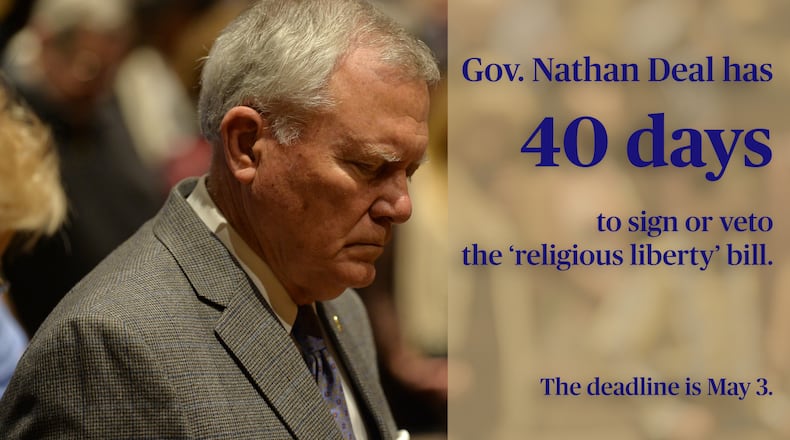UPDATE: 3/28/2016: Georgia Gov. Nathan Deal will veto religious liberty bill
Gov. Nathan Deal faces one of the most consequential decisions since he moved to the Governor's Mansion when he decides whether to sign or veto the "religious liberty" measure that's roiled the state Capitol.
The two-term Republican has until May 3 to decide whether to approve House Bill 757, which lawmakers passed after more than three years of legislative debate. His office declined to comment on Friday, referring to an earlier statement that he'll vet the bill in April.
As the legislative session came to a close Thursday, he said only that his decision could come quickly.
“I’ll try to act as expeditiously as possible, especially on major pieces of legislation,” he said. “We don’t have a time frame.”
Here's a breakdown of the debate:
Why do supporters want it?
Religious conservatives have lobbied for measures they say would protect religious viewpoints and prevent discrimination against faith-based groups since the debate in Georgia began, but this year it was linked to the U.S. Supreme Court's same-sex marriage ruling.
Why do critics hate it?
Business leaders and gay rights activists cast it as little more than legalized discrimination and warn it can irreparably harm Georgia's business reputation. They point to the blowback in Indiana, when corporate outrage over a similar measure put the Midwestern state in the middle of a media firestorm.
What does it actually do?
The "compromise" legislation that emerged on March 16 would allow faith-based organizations to deny services to those who violate their "sincerely held religious belief" and preserve their right to fire employees who aren't in accord with those beliefs.
It also mirrors language found in the federal Religious Freedom Restoration Act, which was signed by President Bill Clinton and adopted by dozens of states, requiring government to prove a “compelling governmental interest” before it interferes with a person’s exercise of religion. And it includes a clause saying it could not be used to allow discrimination banned by state or federal law.
What kind of reaction has there been?
Plenty. Some of the state's most prominent business boosters have mobilized against the bill. And leaders of major international tech corporations, including Apple, Intel, PayPal, Salesforce and Yelp, have called on Deal to veto the measure. The Human Rights Campaign has called on Hollywood film companies to abandon Georgia if Deal signs the measure. The state's pro sports franchises have all criticized the bill, and the National Football League suggested it could jeopardize Atlanta's Super Bowl bid.
And even supporters are keen to point out that it doesn't go far enough for them.
Has it all been negative?
The conservative Faith and Freedom Coalition launched robo-calls urging people to call Deal's office and tell the governor to support the bill. The Georgia Baptist Mission Board has marshaled its 1.3 million members to rally around the bill. The governor's office has been flooded with thousands of emails and hundreds of phone calls, many in support of the legislation. And supporters are digging in. House Speaker David Ralston said the bill is "free of discrimination." And state Sen. Josh McKoon, one of the most outspoken champions of the measure, has vowed another version will be back next year if Deal refuses to sign it.
So, how will he decide?
Deal's comments offer a few clues. In remarkably stark terms, the governor said earlier this year that he would reject any measure that "allows discrimination in our state in order to protect people of faith." Rooting his critique in biblical terms, he urged fellow Republicans to take a deep breath and "recognize that the world is changing around us."
Deal has also zealously guarded the state's pro-business reputation, which he often says has made Georgia the "No. 1 place in the nation to do business." A corporate stampede mirroring the unrest that erupted when similar legislation was adopted in Indiana would do little to bolster that case. Deal, too, is the rare politician who doesn't have to worry about ticking off the base; he is term-limited and never has to face the voters again.
Does that mean he will veto?
Not necessarily. The “religious liberty” debate resonates like few others among the dedicated activists that make up Georgia’s Republican core.
The state GOP's delegates gave the legislation a ringing endorsement at its 2015 convention, and lawmakers mindful of opposition in the May 24 primaries are eager for base-pleasing measures in an election year. And at county GOP meetings in March, one lawmaker after another trumpeted the bill's passage as a sign that Republican conservative leadership was working.
What's more, Deal also will need rank-and-file Republicans to support his plan to "revolutionize" the state's education system.
What has Deal said about the bill since it passed?
Not much. He said two days after the bill passed that he was "pleasantly surprised" lawmakers reached a compromise over the debate but that he faces a tough road ahead in considering whether to sign it.
“What will happen will happen,” he said. “I will try to use my best judgement to do what the people of Georgia elected me to do, and that was to make the best decision for the people of this state as a whole.”
More: The behind-the-scenes story on Georgia's religious liberty debate
More: Weeks of debate ahead over Georgia's religious liberty bill
About the Author
The Latest
Featured




